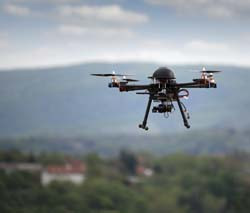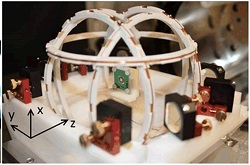Fighting crime on land and sea with RPAS
Stopping vehicles used in crimes, for transporting dangerous, illegal substances or for carrying out terrorist attacks, is often precarious and endangers the lives of crime prevention personnel such as Police and Border Guards. The occupants of such vehicles and innocent bystanders are also put in danger. To mitigate these risks, the EU-funded project 'UAV based innovative means for land and sea non-cooperative vehicles stop' (AEROCEPTOR)(opens in new window) is developing a remote piloted aerial system (RPAS) to safely and securely control, slow and stop non‐cooperative vehicles on land and at sea. Authorities will be able to quickly deploy RPAs in order to intercept ground and sea vehicles from a distance. Lightweight and low on fuel, RPAS is expected to be cost efficient and environmental friendly. During the first two years of the project, project partners assessed the equipment that will carry out the control and stop functions. RPAS architecture was defined following analyses of VTOL RPA’s, fixed wing RPA’s, satellite communications systems, flight controls and a remote pilot station. Various scenarios of the system usage have been considered. The team investigated the legal and political ramifications of operating RPAS, and also assessed the various potential risks of the technology on the ground and in the air. AEROCEPTOR outcomes should reduce the negative consequences of vehicle pursuits on land and water. RPAS will keep offenders at bay while ensuring the safety of law enforcement officers and unwitting citizens.







